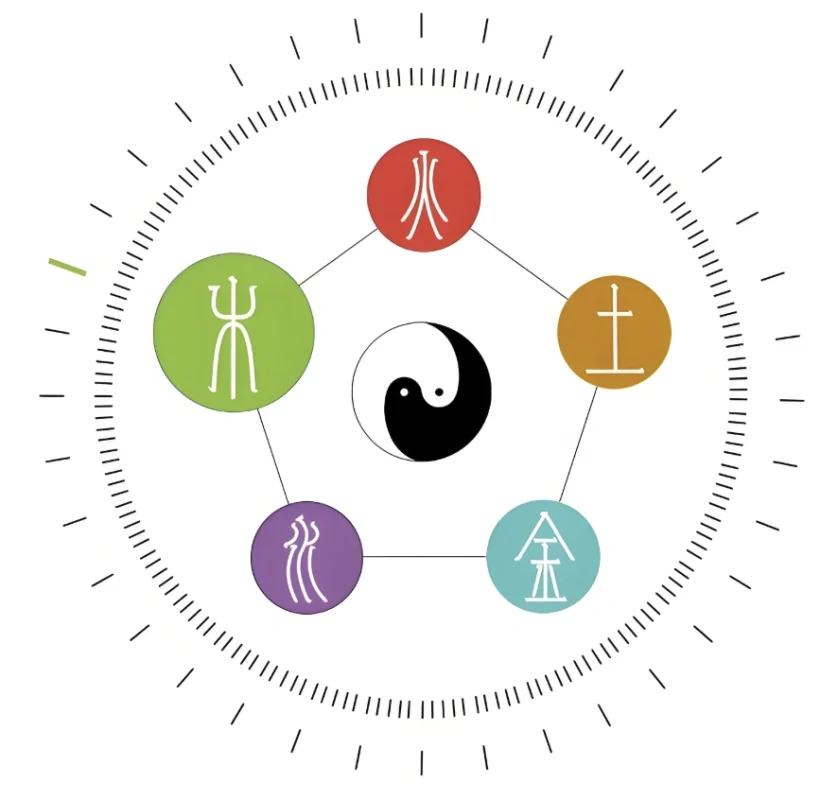What does the relationship between the five elements refer to?
Imagine the ancient Chinese concept of the Five Elements—wood, fire, earth, metal, and water—as the cast of a quirky, eternal drama. In this show, there’s a fascinating subplot called “Victory and Recovery” (or “Sheng-Fu”), which describes how these elements, when things go a bit haywire, not only oppose each other but also cleverly balance one another out.
According to the venerable Nei Jing (The Inner Canon), when an element goes overboard in suppressing another—think of it as an overzealous parent laying down the law—this overwhelming control is dubbed “victory energy” (sheng qi). But nature, with its inherent sense of fairness (and maybe a hint of mischief), isn’t about to let any one element hog the spotlight. As soon as that “victory energy” starts showing off, a counterforce known as “recovery energy” (fu qi) kicks in to even the score. It’s like nature’s own version of “don’t get too cocky, buddy!”
This elegant tug-of-war isn’t random; it follows a time-tested script based on the mutual generation and control principles of the Five Elements. The underlying rule is refreshingly simple: “Where there is victory, recovery will follow.” In other words, no matter how triumphant one element might seem, there’s always a built-in mechanism to pull it back into balance.
To add a bit more poetic spice, some even call this dynamic interplay “the child avenging the mother’s grievance”—a vivid metaphor suggesting that every act of dominance will eventually be met with a compensatory reaction. It’s a timeless reminder that nature, much like a wry storyteller, always ensures the drama resolves with equilibrium in the end.
So, if you ever find yourself marveling at the chaotic yet harmonious interplay of forces in the universe, just remember: even when one part of nature wins big, it’s all part of the cosmic plan to set things right again.
When Victory Meets Recovery
In the heart of Summertown—a cozy Midwestern town where everyone knows your name and a Friday night high school football game is as sacred as Thanksgiving dinner—Jake “Fire” Thompson was the local hero. Fresh off a string of jaw-dropping business victories, Jake’s booming energy lit up the town like the Fourth of July fireworks. His new venture, a flashy tech start-up, had conquered the market with the ferocity of a wildfire. Neighbors cheered, local reporters sang his praises, and for a while, it felt like nothing could stand in his way.
But as the old saying goes in Summertown, “Don’t let the flame burn too hot.” Just when Jake was riding the crest of his success, subtle cracks began to show. His aggressive tactics—once admired as bold leadership—started to overreach. The town’s natural equilibrium, much like the unseen forces of nature, began to stir. It wasn’t long before the consequences of his unchecked ambition came crashing down like a long-awaited storm.
One sweltering summer evening, as the local diner’s neon sign flickered uncertainly in the twilight, Jake’s empire wavered. Clients withdrew their support, partners began whispering behind closed doors, and the vibrant hum of success was replaced by an eerie silence. In that moment, it was as if nature itself had imposed a counterbalance—a recovery energy—that gently but inexorably pushed back against his overwhelming “victory energy.” It reminded everyone of a timeless truth: for every surge of triumph, there’s an inevitable, humbling recoil.
In his lowest hour, sitting alone in a worn leather booth at Rosie’s Diner, Jake encountered Lily “Water” Martinez—a lifelong friend known for her steady grace and warm heart. Lily’s soft-spoken words, laced with the wisdom of someone who’d weathered her own storms, stirred something deep within him. “Jake,” she said, her eyes reflecting both compassion and the calm after a heavy rain, “remember when we were kids, building dams in the creek behind your house? We’d laugh as the water found its way around every obstacle. Maybe this is life’s way of teaching you that even the fiercest flame must learn to bend, to let the cool waters of balance flow through.”
Her words ignited an emotional surge in Jake—a mix of regret, gratitude, and a newfound determination to rebuild not just his business, but his very outlook on life. With every setback, the town seemed to whisper the ancient wisdom of nature’s self-correction: where victory is overzealous, recovery is always waiting in the wings. The following months saw Jake reimagining his strategies, prioritizing collaboration over conquest, and learning to temper his fiery passion with the steady, nurturing influence of humility.
As summer faded into a cooler autumn, Summertown witnessed a quiet transformation. Jake’s venture began to recover, not through aggressive dominance, but through sustainable growth and heartfelt community support. The journey was neither swift nor easy—it was a gradual, emotionally charged climb toward balance that resonated with every person who’d ever felt the sting of failure and the gentle promise of redemption.
In the end, Jake’s story became a local legend—a modern parable echoing an ancient truth: in the dance of life, every triumphant step is eventually met with a gentle, corrective counterstep. And much like the timeless cycles of nature, Summertown learned that true victory isn’t about unbridled conquest; it’s about finding equilibrium, embracing humility, and knowing that where there is victory, recovery is never far behind.

